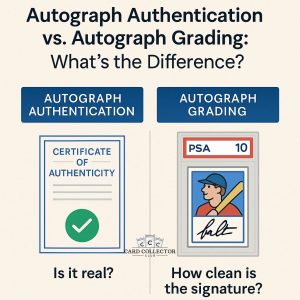Understand the crucial distinction for collectors and investors alike.
When it comes to signed collectibles, not all autographs are equal, and neither are the services used to verify and evaluate them. In this guide, we’ll explain the difference between autograph authentication and autograph grading, when you should use each, and how these services impact both collector confidence and market value.
What Is Autograph Authentication?

Autograph authentication is the process of verifying that a signature is genuine, that it was signed by the person it claims to be.
Professional services such as PSA/DNA, Beckett Authentication Services, and JSA use forensic techniques, signature databases, and expert analysis to determine authenticity. If the signature is confirmed as real, the item receives a certificate of authenticity (COA) or a tamper-evident sticker with a serial number.
Why Authentication Matters
- Builds buyer confidence in trading card auctions and resale
- Prevents fraud and fake signatures from circulating
- Often required for resale platforms like eBay, Goldin, or PWCC
Key takeaway: Authentication is about confirming the autograph is real, not judging its appearance or placement.
What Is Autograph Grading?
Autograph grading, on the other hand, evaluates the quality and condition of the signature itself. Most grading companies assign a score (typically 1–10) based on:
- Ink clarity
- Smudging or fading
- Placement on the card or memorabilia
- Overall aesthetic presentation
This is usually performed in conjunction with card grading but can also be done independently on memorabilia.
Why Grading Matters
- Adds prestige and value to already-authenticated autographs
- Helps buyers distinguish between “any autograph” and a mint signature
- Enhances the visual and investment appeal of the item
In our experience as a PSA Authorized Dealer, a PSA 10 Auto grade can significantly boost a card’s resale value, especially for modern on-card signatures.
Certification vs. Condition: Which Comes First?
The two services serve different purposes:
| Service | Focus | Use Case |
| Authentication | Is it real? | First step for any unsigned item |
| Grading | How clean is the signature? | Adds value after authentication |
If you have a signed item that isn’t yet verified, authentication should always come first. Once confirmed, grading becomes an option to enhance its marketability and appeal.
When to Use Autograph Authentication
You should seek authentication if:
- You purchased a signed card from a show or private seller
- The item lacks a COA or known provenance
- You’re preparing for card consignment or auction
Submit your autograph through Card Collector Club’s PSA services »
When to Use Autograph Grading
Grading is ideal when
- You have a slabbed auto and want to maximize resale potential
- The signature is bold, centered, and flawless
- You’re building a high-end investment collection
FAQs: Autograph Authentication vs. Grading
Q: Can I grade an autograph without authenticating it first?
A: No. Grading services only assign grades to authenticated autographs.
Q: Do all PSA-graded cards include autograph grades?
A: Not always. You must request the autograph grading add-on when submitting your card.
Q: Will a low auto grade hurt the value of my card?
A: In some cases, yes. For premium cards, a poor autograph grade (e.g., 6 or below) can deter investors. It may be better to authenticate only.
Final Thoughts: Know What You’re Submitting
Understanding the difference between authentication and grading empowers collectors to make better decisions. Whether you’re safeguarding your collection or planning to resell, clarity in certification and condition goes a long way.
As a trusted PSA Authorized Dealer, Card Collector Club offers expert handling of both grading and authentication services. Submit your items with confidence and elevate your collection today.
Ready to submit your autographs?
Visit our Grading Services page or learn more about PSA to get started.
